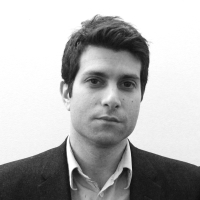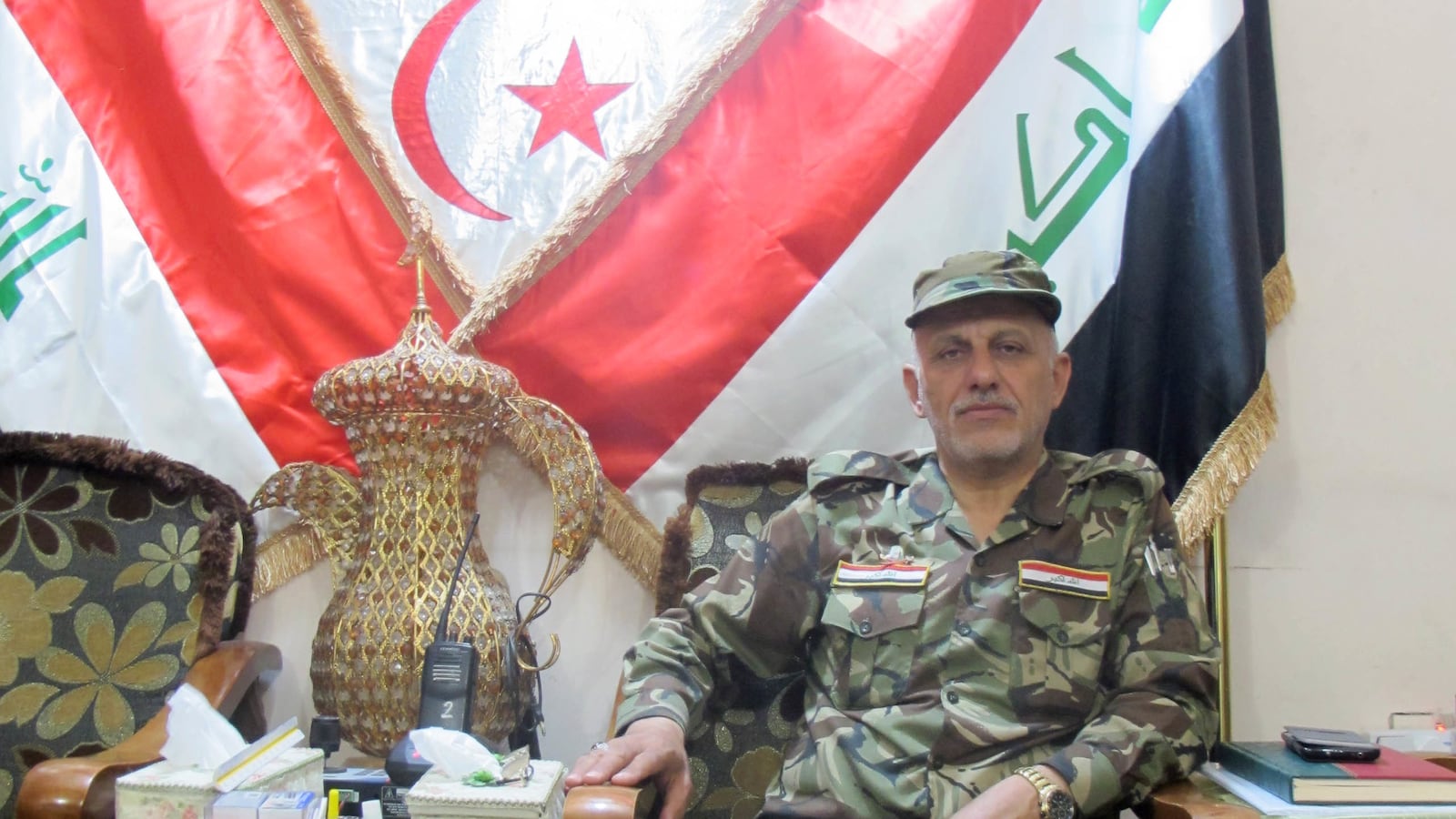BAGHDAD, Iraq -- On the night of July 14, after being served a generous dinner in one of Baghdad’s better neighborhoods and then given a tightly controlled, almost scripted interview, I watched a video of a man being tortured. I was meeting with a former leader in the Mahdi Army, Iraq’s largest Shia militia. Sheikh Raad al-Khafaji had invited me to break the Ramadan fast in the headquarters of his recruiting operation. Shortly after the fall of Mosul to the Islamic State in the first half of June, he had sworn allegiance to the government and begun coordinating volunteers for the Iraqi security forces. When I met with him, he had sent an estimated 5,000 men to fight.
“They are army, not militia,” the sheik repeated throughout our conversation. When one of his young recruits, Hussein Ali Hadi, identified himself as a member of the Peace Brigades, the new name given to the Mahdi Army, he was quickly corrected. One of the sheik’s associates, an older man who introduced himself as a biology professor at the university of Baghdad, interjected in English: “He is in the Peace Brigades but they work with the 9th Iraqi Army battalion.”
“It is exactly as I told you,” the professor added, “they are not militia, they are army.”
When I arrived in Baghdad in mid July, the Islamic State, formerly ISIS, was butchering its enemies and leading its allies toward the gates of the capital. The fiercest fighting was still in the north but car bombs and suicide attacks were increasing as the war detonated in flash points inside the city’s walls.
Most Baghdadis and outside observers anticipate that if the city falls it won’t be from being overrun by ISIS forces but through a terrorist campaign. The aim of an ISIS offensive is to further destabilize the already weakened government and target the city’s Shia population, triggering a wave of retaliatory violence against Sunnis. By radicalizing Iraqis through violence and triggering a broader sectarian war, ISIS believes it can expand its authority over Sunnis who will look to the group for protection and strengthen its state.

Since the initial collapse of the Iraqi military in the north, the government has relied on Shia militias in its war effort. Empowering these groups may have been the only way to hold back the ISIS advance but it has blurred the lines between state and sectarian power, defense and revenge.
Away from the sheik and the other older men in his entourage, I got a minute alone with Hadi and another young recruit, both of them just back from fighting ISIS in the north. I wanted to ask them again about their claim that most ISIS men are foreign fighters, something that is commonly repeated despite the group’s apparent domestic support. Before I could ask the question, Hadi’s friend Aala took out his phone. “This is one that we captured in Balad. A Saudi,” Aala said.
The video showed a blindfolded man kneeling on the ground with his hands bound behind his back. The man is punched by one figure, then kicked by another as Aala and his friends take turns beating him on screen. As I watched, Hadi and Aala narrated the video, giving enthusiastic commentary. On screen a man kneels behind the prisoner and rubs his palm into the captive’s back. “This is to keep him awake,” Aala said, as salt was ground into the prisoner’s wounds.
Given ISIS’ emphasis on publicizing its own acts of torture, it wasn’t shocking to see young fighters from the other side doing the same. But the video complicated the sheikh’s claim that his volunteers took their orders from the government and had no sectarian agenda. If official Iraqi Security Forces tortured someone, it’s unlikely they would volunteer the evidence to a journalist. I believed that I’d gotten a glimpse at something the sheik didn’t want me to see.
Then I saw that Aala had shown another reporter the same video. The sheik seemed to keep his young fighter on hand for meetings with journalists. What I’d taken as a peek behind the curtain may have been the most orchestrated moment of the night.
The video itself was clear enough but the message it was intended to convey never came entirely into focus. If the record of torture was being deliberately leaked it may have been to threaten ISIS supporters that the militia forces, even those working with the military, were capable of their own brutality.
The memory of Iraq’s last civil war, when sectarian death squads and terrorist cells defined victory through slaughter, is less than a decade old. It’s recent enough that it provides consolation for Baghdadis who point out that it’s not that bad yet, but also it’s a grim foreshadowing of what might come next.
One member of the Mahdi militia who supported the military’s fight against ISIS but had not made any allegiance to the government, told me, “I only want to protect my family and the Shia holy places from ISIS.” He didn’t want a civil war, he said, or to pursue vengeance. “But if this goes on I can’t say what my neighbors will do. They might begin to just kill Sunnis.”
“This is nothing like 2006,” my Sunni driver said and waved towards Baghdad lit at night outside our car’s window. This was on July 16, after a car bomb exploded in Sadr City killing at least nine people and wounding dozens.
“Back then there were no lights, only from bullets and fires. You couldn’t leave your house at night. If you weren’t killed you would be kidnapped or arrested.” He’d been arrested once in 2006. He was taken off the street by the Iraqi army and held in an American prison until the military police unit holding him realized there was nothing to charge him with and let him go.
In a dozen meetings over two weeks, the only two people who expressed support for the current government were sheiks, the two most powerful men I met.
Before I met sheikh Raad at night, I’d gone that afternoon to Adhamiyah, a well-to-do Sunni area in Baghdad, where a large private generator buzzed outside the gate of sheikh Amir Saqr al Azawi’s house.
A Sunni leader in Baghdad Sahwa’s movement, now in his eighties but still elegant in gold rimmed glasses and a crisp dishdasha, the sheik introduced himself in English. In Arabic he criticized the government. “They never respected the Iraqi people,” he said. “They turned the people away from them and toward ISIS.” The government had made mistakes. “But if you don’t make mistakes you won’t learn and we must help them to learn,” he said.
“The government asks us to stay and guard our streets,” the sheik said, as he turned from me back to the split-screen view from his security cameras.
I asked him about the threat of a new civil war and he countered with one of his own. In English, he asked me:
“Jeekob, how long was your country’s civil war?”
“It went on for five years,” I said.
“Thank God our own war wasn’t that long.”






